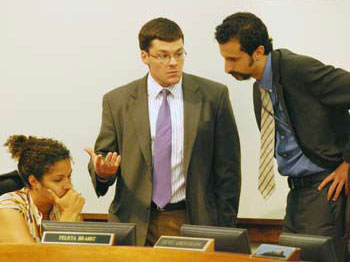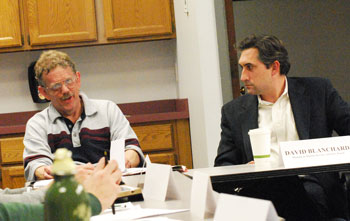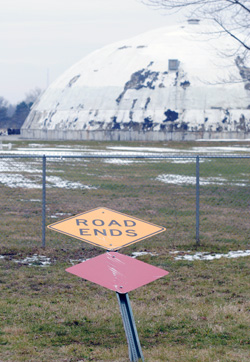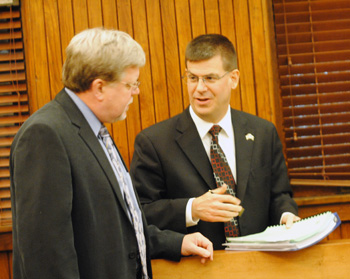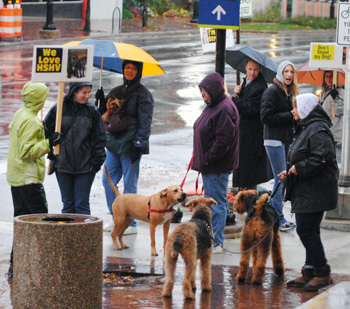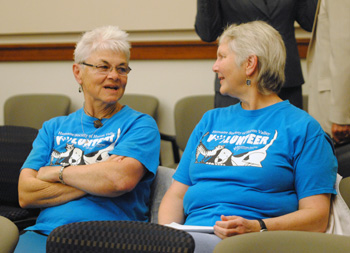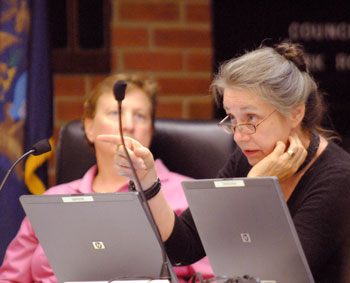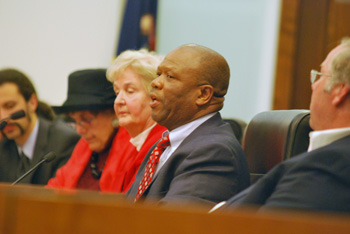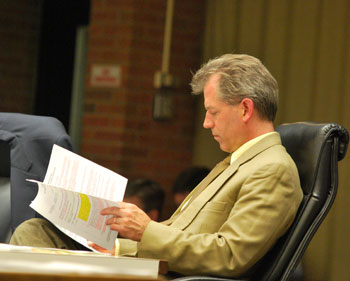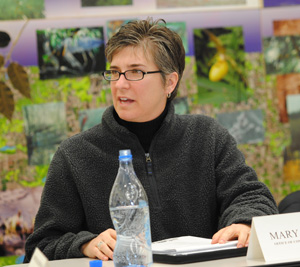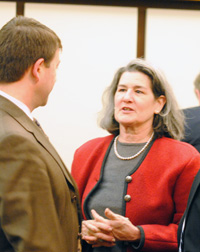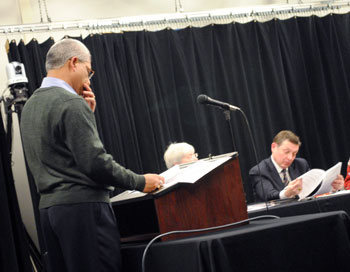Washtenaw County board of commissioners meeting (Aug. 7, 2013): A packed agenda and lengthy debate on several items led to a meeting lasting over five hours, with some issues postponed until September.

Commissioners Alicia Ping (R-District 3) and Conan Smith (D-District 9). Smith brought forward a proposal to allocate money from the general fund’s reserves to pay for previously cut social service programs, but the proposal didn’t win support from Ping or most other commissioners on Aug. 7. (Photos by the writer.)
Following an unexpected proposal from the floor and considerable discussion, commissioners gave initial approval to authorize a $654,670 increase in 2013 general fund revenues and expenses, bringing the total general fund budget to 103,218,903. [.pdf of 2013 budget adjustment chart]
Despite the better-than-anticipated revenue picture, the administration is still projecting a deficit of $3.9 million for next year’s 2014 budget.
Generally, mid-year budget adjustments are recommended by staff and are typically dispatched with minimal discussion. However, a proposed amendment by Conan Smith of Ann Arbor (D-District 9) would have transferred money from the general fund’s unearmarked reserves to restore over $1 million in funding to programs that had been previously cut. He argued that restoring this funding was possible in light of $2.3 million in higher-than-expected property tax revenues this year.
Several commissioners expressed general support for Smith’s intent, but cautioned against acting quickly and not giving sufficient strategic thought to these allocations. They had seen the proposal for the first time that night. Smith argued that he had asked for the budget adjustment resolution to be pulled from the agenda prior to the meeting, because he had wanted more time for discussion. Chastising other commissioners for not taking action to spend the unanticipated revenues, Smith noted that the board had identified human services as a priority, but was instead funding things like software and facilities. He told commissioners it was “one of the worst nights I’ve ever had on this board.”
The board voted down his proposal, but then postponed a final vote on the overall budget adjustments until its Sept. 4 meeting. Several commissioners indicated an interest in working with Smith to address some of his concerns before then.
The 2013 budget was also a highlight during a second-quarter update by the county’s financial staff, who reported that they’re now expecting a $245,814 general fund surplus for the year. In addition, the 2013 general fund budget is not expected to need a previously planned use of $2.8 million from the fund balance. [.pdf of 2Q budget presentation]
In other business, commissioners held a lengthy debate over a resolution for a new case management software system for the Washtenaw County Trial Court that’s estimated to cost $2.3 million. An original resolution had outlined funding sources for the project. However, prior to the meeting some commissioners expressed concern about the use of capital reserves to help fund the purchase, so an alternative resolution was brought forward at the meeting that did not include the references to funding sources.
However, Dan Smith (R-District 2) objected to passing a resolution that approved the purchase but did not include a funding plan. Alicia Ping (R-District 3) was concerned that there had been no clear source of funding identified for the system’s annual licensing fee, estimated at $188,933.
An amendment to that alternative resolution – made after considerable discussion and procedural maneuverings – stated that the board approved the selection of this software system, and directed the county administrator to develop a maintenance and implementation plan, and to identify funding sources by the time of the board’s Sept. 4 meeting. That amendment was not enough to win support from D. Smith and Ping, however.
The resolution received initial approval on Aug. 7, but did not garner sufficient votes for final approval. It will be considered again on Sept. 4.
The board also debated – and ultimately approved – two long-term leases: (1) the 10-year lease of a county-owned Head Start building at 1661 Leforge Ave. in Ypsilanti to the Washtenaw Intermediate School District; and (2) a 9-year lease with Dahlmann Apartments Ltd. for space in the City Center Building at 220 E. Huron in Ann Arbor.
Other action included approval to back up to $3.3 million in bonds to pay for five drain-related and “green infrastructure” projects in Ann Arbor, and authorization to amend a contract between Washtenaw County, Lyndon Township and Sylvan Township related to a sewer system in those townships.
Several grants were accepted during the meeting: (1) about $2.5 million in federal workforce development funding; (2) a $665,704 federal grant to pay for two outreach workers with the Washtenaw Health Plan (WHP), who will focus on increasing children’s participation in federal Medicaid and the Children’s Health Insurance Program (CHIP), known as children’s Medicaid; and (3) a $20,000 capacity-building grant from the Ann Arbor Area Community Foundation for work on the Washtenaw food policy council.
Mary Kerr, president of the Ann Arbor Area Convention & Visitors Bureau, was on hand with several representatives of the United Association (UA) Union of Plumbers, Pipefitters, Sprinkler Fitters, Steamfitters, and Service Technicians. The UA is holding its 60th annual training program in Washtenaw County from Aug. 10-16. It’s the 24th year that UA has held its training program here. More than 2,500 participants will generate an estimated $5 million into the local economy, Kerr said: “The UA leaves this community in much better condition than when they came at the beginning of the week.” [Full Story]





